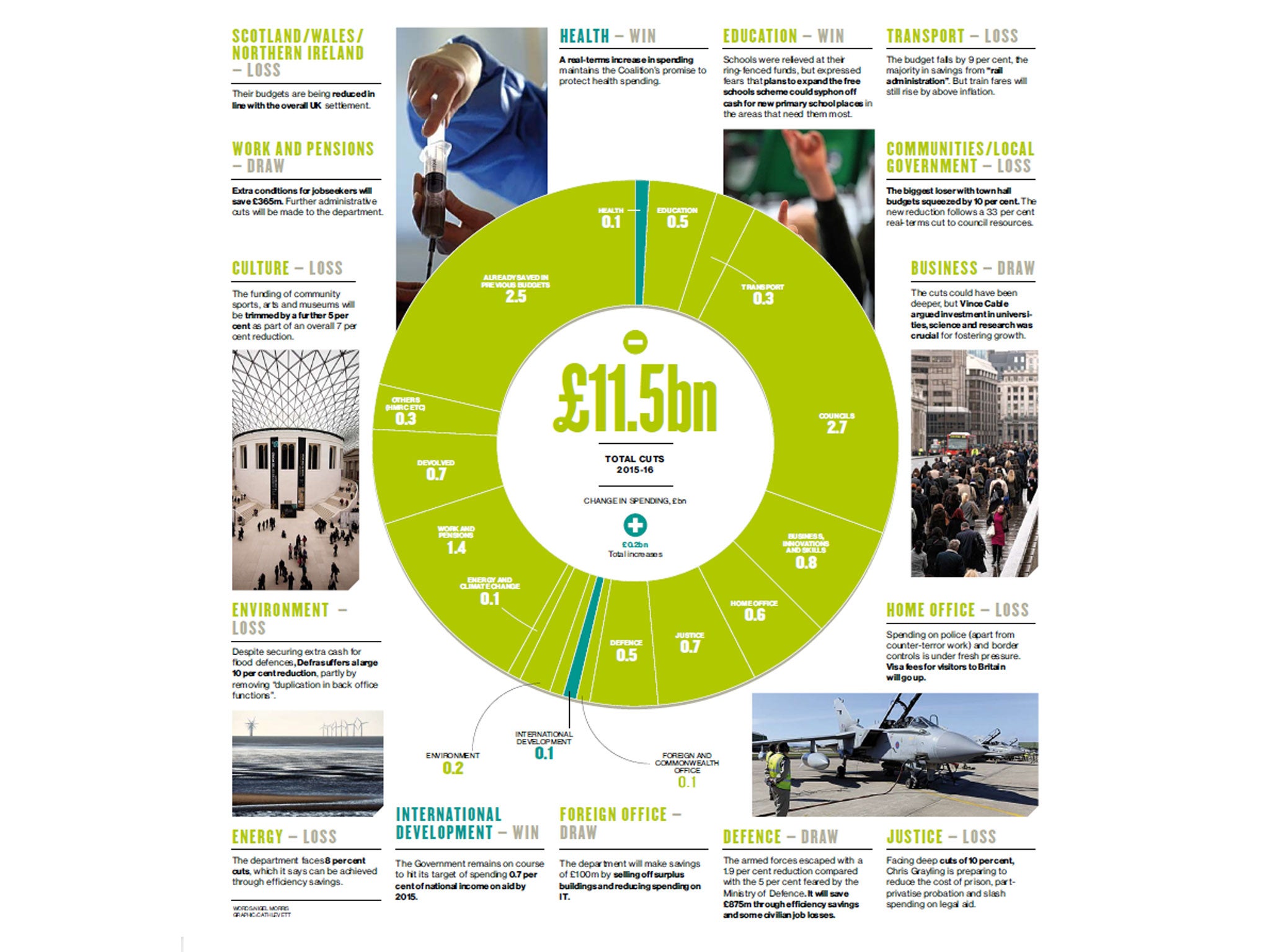Rules of state spending are being reconsidered
The limits of the cuts are being reached – and now nowhere is safe from the axe


Your support helps us to tell the story
From reproductive rights to climate change to Big Tech, The Independent is on the ground when the story is developing. Whether it's investigating the financials of Elon Musk's pro-Trump PAC or producing our latest documentary, 'The A Word', which shines a light on the American women fighting for reproductive rights, we know how important it is to parse out the facts from the messaging.
At such a critical moment in US history, we need reporters on the ground. Your donation allows us to keep sending journalists to speak to both sides of the story.
The Independent is trusted by Americans across the entire political spectrum. And unlike many other quality news outlets, we choose not to lock Americans out of our reporting and analysis with paywalls. We believe quality journalism should be available to everyone, paid for by those who can afford it.
Your support makes all the difference.What do we really want governments to do? When the Coalition came to power it faced a catastrophe: a budget deficit of 11 per cent of GDP, the highest of any large economy in the world. So it had to cut spending and increase taxes.
Taxes went up pretty much straight away but cuts in spending were spread out over the life of the parliament. As for these cuts, the Coalition’s judgement was that there were certain types of spending that we as voters and taxpayers want to protect, principally the NHS, pensions, and schools – and overseas aid. That was around one-third of all spending. So the remaining two-thirds had to be cut even harder.
That is what has happened. But because growth and tax revenues have fallen short of estimates, the squeeze has had to be continued for even longer. The deficit is still 7 per cent of GDP. This new review adds another year to the squeeze, taking it into the first year of the next parliament. But the problem, an obvious one, is that while it is relatively easy to cut things for one or two years, it gets progressively harder to do so as the programme rolls into years four, five and six.
Even the departments that have been protected, or relatively so, will feel squeezed because they are faced with rising demands on them.
This latest spending review pushes against the limits of the possible. As Paul Johnson, director of the Institute for Fiscal Studies notes, by 2017/18 the unprotected parts of government will have faced cuts of one-third since 2010. He describes this as astonishing and concludes that there will have to be further tax rises after the election.
These latest figures are for the first year of the next parliament and while the Opposition has pledged to stick to them, in the real world they will be tweaked, probably quite a bit. Indeed you can already catch a feeling for the way in which the balance of spending is likely to shift after the election, whoever wins it.
The notion that you can protect any aspect of spending is being softened. Welfare spending is being capped and access tightened.
Rich pensioners, or at least those living in sunny Spain, will see their payments trimmed.
Public sector workers will be squeezed, and remember the voting arithmetic of that: there are five private sector workers for every one public sector worker. Even the NHS is starting to see its funding reallocated a bit.
So we are gradually getting leaner government, much leaner in some areas, a little leaner in others.
Of course the £750bn spending bill is huge, but so too are the demands upon it. Ultimately it will be voters that decide what they want to pay in tax and what they want governments to do with the money.
Until the Coalition came to power the assumption of politicians of both parties was that voters were basically on the side of better services, as long as the tax bill did not rise too much.
The experience of the past three years has certainly changed the mindset of politicians, for they see that promises to spend more are not only not credible: that may not be what people want.
The about-turn by the Opposition, now supporting strong fiscal control, is a sign of that. The shift of mood, particularly among the young, against welfare spending is another sign.
It is a difficult adjustment. Of course it is very difficult for the spending departments, for local authorities, indeed for the entire public sector, relentlessly being forced to do more with less. But it is also a difficult adjustment for politicians, for this is not what most of them came into politics to do. And of course we do not know what voters really do want, for they have yet to be confronted with the reality of the squeeze outlined in a little more detail.
Maybe we do collectively want leaner government – but we have yet to see what that will entail.
Waterloo to be restored for anniversary
The site near Waterloo in Belgium, where Wellington defeated Napoleon, will be restored for the battle’s 200th anniversary, the Chancellor has announced. Mr Osborne joked that the restoration would “celebrate a great victory of coalition forces over a discredited former regime that had impoverished millions”.
Join our commenting forum
Join thought-provoking conversations, follow other Independent readers and see their replies
Comments